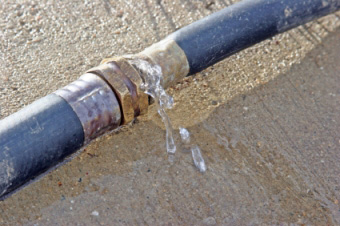Does my homeowner’s insurance policy cover water damage?
Kathryn Hawkins
You may think that your homeowner’s insurance policy will cover the cost of water damage after you’ve paid your deductible—but is that always the case?
Water or flood damage to your home can be extremely expensive to repair: According to the National Flood Insurance Program, the total cost to repair a 2,000-square foot home that has six inches of water damage would cost $39,150 on average.
Costs included in those repairs include:
- Cleaning fees.
- Refinishing or replacing flooring.
- Repairing doors, windows, and trim.
- Repairing electronic devices.
- Electrical and plumbing work.
Here’s a look at four common water damage situations and how your insurance company might handle them.
Does my home insurance policy cover water damage?
1. What if my pipes burst?
A burst pipe can cause thousands of dollars in water damage to your home. Fortunately, the majority of the damage generally will be covered by your homeowner’s policy: “It will cover the water damage to the surrounding walls, house frame and personal property,” says Drew Delaney, a property and casualty insurance agent in Michigan. However, “a standard homeowner’s policy won’t cover the repairs to the burst pipes.”
In some cases your insurance company may deny your claim if the adjuster believes that you were at fault for the burst pipes. This can happen if you let the house temperature drop so low that the water froze in the pipes. If you maintained a proper temperature in your home, or if you winterized your home by shutting off the water supply and draining the system, you aren’t likely to be found at fault.
However, if you turned off the heat during cold weather without taking proper precautions, your claim could be denied.
2. What if my washing machine leaks and floods the home?
Washing machine-related water damage is one of the 10 most common forms of water damage, according to a study from the Insurance Institute for Business & Home Safety. In more than 50 percent of cases, the damage results from a leak in the supply hose, which connects the appliance to your home’s water supply.
In this situation, your insurance adjuster will consider the age and state of your washing machine in determining whether the water damage should be covered by your policy. In some cases, your insurance company may claim that the leak was brought on by normal “wear and tear” to the machine, and that you were responsible for maintaining or replacing the appliance.
However, under most homeowner’s policies, if the damage is considered “accidental,” the claim will be covered. For instance, Erie Insurance states that if a washing machine hose leaks or explodes, damage will be covered; however, if the water damage is due to an ongoing leak, it is considered to be preventable and will not be covered.
If you spot problems with your washing machine, it’s essential to repair or replace it right away in order to be eligible for coverage.
3. What if a leak in my roof causes water damage?
Whether the damage to your roof and home interior will be covered depends on if the roof leak was caused by a “covered peril” under your policy.
In general, Delaney says, “covered perils” include wind, rain, hail and fire. If the insurance adjuster finds out that the damage was caused by an old roof in need of replacement, the damage wouldn’t be covered.
Additionally, if the roof damage occurs during a flood or hurricane, the damage may not be covered.
Although many homeowner’s policies will cover wind damage from hurricanes in their coverage, claims often are subject to much higher “hurricane deductibles,” which can add up to 1 to 5 percent of the house’s insured value, as compared to the typical $500 to $1,000 deductible for other home insurance claims. If your claim amount doesn’t exceed the total deductible, it may not be worth filing a claim.
4. What if a flood from a hurricane or storm damages my house?
Flood damage isn’t covered under standard homeowner’s policies, Delaney says, regardless of whether the damage was brought on by a storm or a hurricane defined as a tropical storm with winds exceeding 74 miles per hour at the time it causes the damage to your home).
“Flood coverage can be purchased either from the U.S. government or a private insurance company,” he says. According to the Insurance Information Institute, the average annual premium for a flood insurance policy through the National Flood Insurance Program is $644, with an average coverage amount of $229,707.
In many coastal and hurricane-prone regions, it’s mandatory to purchase a flood insurance policy if you have a mortgage on your home. You can find more information on whether you should buy flood insurance and what it might cost at floodsmart.gov.
If you haven’t purchased flood insurance before the event of a storm, you will be responsible for paying for all flood-related damage out-of-pocket, though wind-related damage may be covered after you reach your policy’s deductible or a higher “hurricane deductible,” depending on your policy details.
How to avoid getting water damage
You should properly maintain all appliances and structures associated with your home that could be associated with water leakage. Make sure to replace old washing machine supply hoses, and to replace aging roof shingles before water damage occurs.
You should also consider purchasing a flood insurance plan if you live in a flood-prone area or are concerned that if any flood damage occurred on your property, you would not have the financial resources to make the necessary repairs.
Also, look over your existing home insurance policy closely and ask your agent questions about what’s covered in various scenarios. If you take these precautions, you may be able to avoid paying out of pocket for costly surprise repair fees.
See how much you could save today on your home insurance. Get your free home insurance quotes today!
